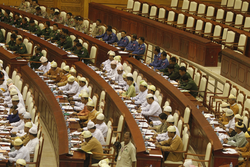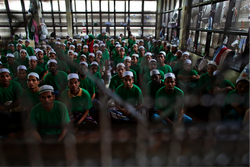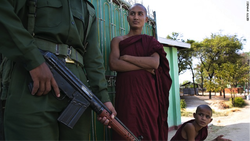International organizations are outraged over proposed legislation being negotiated in the Myanmar Parliament which would require individuals to obtain government approval before converting to, or adopting, a new religion. Myanmar (Burma) is a primarily Theravada Buddhist nation of 54 million people with a generally poor, but improving, human rights record. President Obama has visited Myanmar twice in recent years, placing an international spotlight on the country as it begins its path to reform. Although Myanmar President Thien Sein has introduced increased governmental transparency, the inaugural elections under the new democratic system upcoming in October are already marred in controversy. Myanmar parliamentarian and famed pro-democracy advocate Daw Aung Sun Suu Kyi claimed in November that domestic reforms had stalled.

Human Rights Watch reports that the proposed legislation would also prohibit Buddhist women from joining an inter-faith marriage, criminalize extra-marital affairs, and penalize women who have multiple children within a 3-year period. Amnesty International (AI) insists that Parliament reject or revise the laws, which they claim would “risk fueling further violence against religious minorities,” and contribute to the already widespread discrimination against women. The proposed legislation also prescribes discriminatory obligations on non-Buddhist citizens, particularly effecting Muslim minority populations.
Concerns with the proposed legislation focus on four draft bills, which are opposed by AI and the International Commission of Jurists (ICJ) on the grounds that they violate international law and have dire human rights implications.
- The Religious Conversion Bill requires anyone who wants to convert to a different faith to apply through a state-governed agency. It establishes “registration boards” who “approve” conversions. It is a clear violation of the ICCPR.
- The Buddhist Women’s Special Marriage Bill exclusively regulates marriage between Buddhist women and men from other religions. It discriminates against women and non-Buddhist men. It is a violation of CEDAW.
- The Population Control Healthcare Bill establishes a 36 month “birth-spacing” interval between allowed child births. It does not have a clear enforcement mechanism and could lead to forced reproductive control.
- The Monogamy Bill is aimed at consolidating existing marriage and family laws, but most notable criminalizes extra-marital relations.

Ethnic and religious minorities in Myanmar have been subjected to ongoing and systematic discrimination for years. Recent reports from Rakhine state show that discrimination against the ethnically Muslim Rohingya population is pervasive and is only likely to increase if public sentiment generated by the proposed laws encourages the discrimination. Non-Buddhist women in Myanmar are subject to widespread discrimination and the law would increase the potential for legally sanctioned abuse. AI’s Asia-Pacific Director, Richard Bennett, is particularly concerned that the language of the laws plays into the “harmful stereotypes about women and minorities, in particular Muslims, which are often propagated by extremist national groups.”
Racial and religious tensions in the country are rising; heightened by the election and the November 18th arrest of a Burmese ISIS member following an accidental blast in bordering Burdwan, India.

Some Buddhists in Myanmar feel the laws are necessary to prevent further violence. Myanmar Parliamentary Speaker Shwe Mann urged Parliament to pass additional legislation establishing and protecting a national religion. Political activist Monk Ashin Parmouhka told a Democratic Voice of Burma reporter “If you want to see peace and an end to religious and racial conflict in Burma, [the religion legislation] must be adopted. If you want more conflicts and unrest in the country, then don’t adopt the laws.”
While Myanmar is not party to the International Covenant on Cultural and Political Rights, it is a party to the UN Convention on the Elimination of all Forms of Discrimination Against Women (CEDAW) and the UN Convention on the Rights of the Child (CRC). In a joint statement, AI and the ICJ claim the laws are in violation of the country’s existing international treaty obligations. They fear that these draft laws are discriminatory and will result in human rights violations, including the right to freedom of thought, conscience and religion, the right to privacy, children’s rights and the right to freedom of expression. The legislation is currently tabled in Parliament, no date has been set for a vote.
Jeremy Goldstein is a 2L law student at University of Denver Sturm College of Law and a Staff Editor for the Denver Journal of International Law and Policy.

